The Checker Maven
The World's Most Widely Read Checkers and Draughts Publication
Bob Newell, Editor-in-Chief
Published every Saturday morning in Honolulu, Hawai`i
Noticing missing images? An explanation is here.
The Lindyville Checker Club, Part 2

For the beginning of the story, go back and read Part One.
The Lindyville Checker Club was only open on Wednesday evenings and Saturday afternoons, so he thought he would be safe.
It was 11 PM, Thursday evening, on a cold winter's night, the wind sweeping across the Iowa plains with little to stop it. Hardly any one would be out. But William made sure he was in an interior room, with just one weak candle casting a dim, yellowish light. Just to be sure, though, he had pulled all the curtains tightly shut in the outer room.
The Checker Club had space on the upper story of the grain and feed store, a few old wooden tables and worn chairs scattered about a large room lined with sacks and boxes of farm supplies. Old Johnny Uggerud, the owner, was a checker player and let the Club use the space for free during the winter season, when he didn't need so much inventory. During his busy season, the Club had to close because Johnny needed all the space, but no one wanted to play checkers in the summer anyways.
William was the one who had organized the Club, a couple of years back, in 1898. There were about a dozen members, give or take; Lindyville was just a little town of about 500 people, but William took pride in having been able to start a club and keep it going. It had even gotten a mention in the American Checker Player magazine.
William shivered. Johnny turned off the iron stove downstairs promptly at five, when he closed up his shop, and there was no stove upstairs, so it got very cold very quickly. But William didn't plan on being here long.
Everyone knew that William was putting together a book of checker problems. But what he had to do tonight had to be done quickly and alone, without anyone knowing, unless it came to the worst. He had a plan for that, and tonight's secret labors were part of it.
William had come to town maybe five years ago, straight from the East. He never said a whole lot about what he had done in back there, but it must have made him some money, because one day he just got off the train and took a room in the hotel.
He spent about a month scouting around the town, talking to just a few people, and not answering any questions, not even from Sheriff Conway. The Sheriff wondered about William but didn't have any reason to do much more than that. It wasn't often that someone of independent means came to Lindyville with nothing particular in mind.
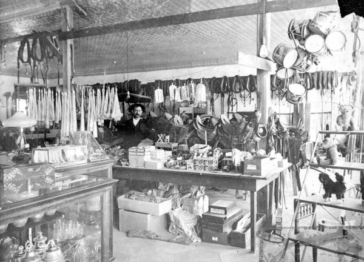
But at some point William must have chosen to put down stakes, because when Tim Forsch decided to retire and sell out his general store, William bought him out; he gave Tim his asking price without the slightest amount of bargaining. Tim thought it was kind of odd but took the money without asking any questions, and moved away to Iowa City to stay with his daughter and her family.
After that William started to get a little more friendly with the townsfolk, who had now become his customers. It turned out he shared an interest in checkers with some of the others, and so the Lindyville Checker Club came to be.
It was something like two weeks ago that William got the letter. He'd never forget a word of it.
"I know who you are and I know why you're there. You've got something that's mine and I'm coming to take it, and I'm going to take care of you, too."
The letter was postmarked Denver and was unsigned. It didn't have to be. William knew who it was from.
He wrapped himself tightly in his overcoat and sat at the desk in the little room, his manuscript and an old map in front of him. He'd have to finish tonight. He was running on borrowed time and he knew it.
At about 3 AM, he was done. He put the map in a trash can and lit a match, touching the flame to the edges of the map. It caught fire at once, crumbling quickly into brown and gray ash. William used the end of an umbrella to separate the ashes and put out the last sparks.
It was then that he heard a noise in the outer room. It sounded like a creaking floorboard. He had an ominous premonition about what that meant. He tugged on the bottom drawer of his desk, the drawer where he kept his loaded Smith & Wesson.
But the door to the room burst open and before he could reach his gun, and something hit him in the back of the head. He fell to the floor, still conscious, but reeling, blackness and light mixing together, spinning giddily. He looked up and saw a figure standing over him.
"You," he said. "How did you find me?"
The figure replied. "Took a while. But you owe me, and I owe you."
A knife descended, penetrating William's chest. The first thrust was fatal, and the killer knew it. He didn't even bother removing the knife.
# # #
Johnny found the body the next afternoon. He didn't go upstairs all that often; when he needed something brought down he sent his young assistant, Chris, who, being one to do as little as he could get away with, made the trip up and down as fast as possible. In any case, the door to the little office was closed and Chris had no reason to go in there.
But around three in the afternoon Johnny needed to look up an old order for a customer who wanted a duplicate. When Johnny opened the office door, he was so shocked that he nearly doubled the body count, coming within a hair's width of having a heart attack.
When he finally recovered enough to talk, he called for Chris, who took his time responding. Johnny sent him out to get Sheriff Conway and Doc Wilson, but from the looks of things the only one that the Doc was going to be able to help was Johnny.
Chris, for once, took something seriously. The Sheriff was out of town but was expected back in a couple of hours. The Doc came right away; he made Johnny lie down in the back room on the first floor, pronounced William dead, told everyone not to touch anything until the Sheriff arrived, and then took off to the tavern for a much-needed drink.
# # #
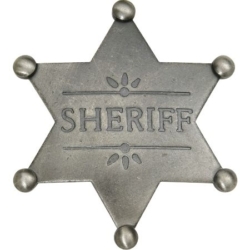
It was around six in the evening. Sheriff Conway went straight to Johnny's shop when he heard the news. The Sheriff made Johnny come back to the shop, even though it was past five. Doc had to come back, too, and the undertaker was told to come in a couple of hours. Johnny complained about not wanting to be in his shop after hours, conveniently ignoring the fact that there was a dead body in the upstairs office. The only one that didn't seem to mind was Chris, who was naively expecting to get paid overtime.
"Tell me again, Johnny," the Sheriff said. He had already taken a look at the crime scene and hadn't found anything useful. Now, they were all sitting around downstairs waiting for the undertaker to arrive.
"I told you already, Sheriff," Johnny said. "I opened the door and there he was."
"William had a key to the shop?"
"Sure he did," Johnny said. "He'd open up for the Checker Club and lock up when they were done."
"But the club didn't meet last night,"
"No, like I said, that's Wednesdays and last night was Thursday."
"Yet, obviously William was here. Do you have any idea why?"
"How would I know? Maybe he was doing some paperwork for the club or fooling with the book of his, you know, the one he's writing with all them checker problems in it."
"Well, whoever stabbed William tore the place apart, obviously looking for something. There's such a mess I can't figure nothing out," the Sheriff said. "You don't suppose you could look around and figure out if anything's missing?"
Johnny was upset enough about having to clean up. He wasn't going to take inventory, too. "Doubt it, Sheriff," Johnny said. "There's years worth of stuff up there. I'd never figure it out and besides, I don't hardly know nothing about William's checker club stuff. Don't hardly know nothing about William, either. Nobody really does."
The Sheriff's suspicions about William hadn't gone away over the years, but he never had anything definite to go on. Neither did he have anything to go on to try to solve the murder. The weapon was an ordinary hunting knife. Dozens of people in town probably had one just like it. There were no witness and no one had seen anything.
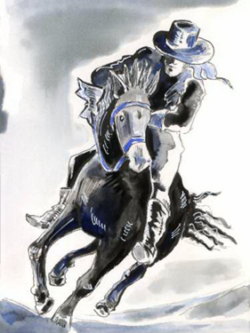
Later on the town drunk told the Sheriff about seeing a man on a horse ride into town and then ride back out a couple of hours later, but old Willie wasn't the most reliable witness and his descriptions were too vague to be of any use.
The case went cold, and it was to stay that way for more than a hundred years. By the time Sheriff Conway retired and moved to Lake City, even he had forgotten most of the details.
Old Johnny did try to straighten out the upstairs office, but it was such a mess he just threw everything into some wooden boxes and piled them in a corner. Years later, Johnny's heirs would move them into a warehouse, where they would lay untouched by anything but mice for many years to come.
TO BE CONTINUED.
# # #
This month's problem is a classic position, and rather easy.
BLACK
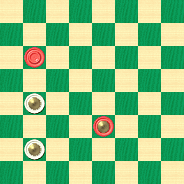
WHITE
White to Play and Win
W:WK25,K17:BK23,9.
When you've solved it, gallop on over to Read More to check your solution.![]()
The Lindyville Checker Club, Part 1

Today, at long last, we begin another seven-part serialized story, The Lindyville Checker Club. We'll give a little more background into the story at its conclusion, but for now we'd just like to begin telling the tale.
A checker problem will be found at the end of each installment. The problems in this series are generally easy.
We hope you enjoy our latest contribution to the literature of checker fiction.
# # #
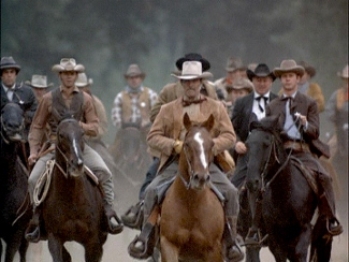
The law was in pursuit, and they couldn't be more than a couple of hours behind. The posse would be at least twenty strong and they would have easy access to fresh horses. For Carl and his three companions, time would soon run out.
"We're going to have to split up," Carl told them. "If we stay together, they'll get all of us. If we go our separate ways, we'll have better chances."
The other men shifted in their saddles and grumbled. But they knew Carl was right. Their horses were tired and they couldn't push them any harder.
They thought it was going to be easy. After weeks of observation, they worked out when the gold deliveries to the Iowa City bank were made. Ambushing the wagon outside of town would be simple; in order to disguise the shipments, the wagons were only lightly guarded.
Everything went according to plan right up until the last minute, when the Federal Marshall decided to ride out and escort the wagon into town. Maybe someone tipped him off or something made him suspicious. But he showed up just as Carl's gang were taking the sacks of gold off the wagon.
The Marshall saw the dead bodies of the wagon driver and the single guard riding with him, and knew better than to take on the gang alone. Realizing that the gold would slow down the gang and tire their horses, the Marshall went back to town and assembled a posse, figuring to catch up with the gang before too long.
"The gold's too heavy for the horses," Carl said. "We gotta unload it and bury it. It's slowing us up too much. When this all blows over, we can come back to get it."
"That means we gotta trust each other," one of the men said. "I don't like it."
"I don't like it neither," Carl said.
"So what's the idea then?" another asked.
"I'll show you," Carl said, grinning. Before the others could react, he had his Colt out of his holster and shot two of them through the head.
The third man, Grigg, was just fast enough. Rather than drawing his gun and trying to shoot it out, he wheeled his horse and took off. Carl fired a couple of shots but Grigg was already too far away.
There was no time to chase him down. Grigg would have to be dealt with in the future. But for now, there was work to do.
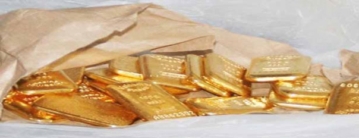
Carl dismounted and took the sacks of gold from the dead men's horses. He put them on his own horse, mounted, and took off.
Carl rode a few more miles. He still figured he had an hour's lead. Then he took his horse off the trail and rode off into the brush. It didn't take him long to stop and bury the gold, making a careful note on his map so he could find it later. Much later, from the looks of it.
He got back on the trail and rode on. Luck was with him; he reached Lake City ahead of the posse. He abandoned his horse and walked into town. He got even luckier when he got to the train station and found that a train going back East was due to leave in just ten minutes. He bought a ticket with one of the gold coins he had secreted in his boots and got on board.
As the train was pulling out, he saw a group of riders coming down the main street. It was the posse. He smiled and chuckled to himself. A change of train or two and they'd never find him. He'd be home free. All he had to do was lay low for a year or two in New York, and then make his way back out west. No one would find the gold where he'd buried it, and it would be waiting for him when the time came.
Grigg might be a problem, but Grigg would never find the gold, and would never find him, either.
Things were going to work out really well. Carl would just have to be a little patient.
# # #

Andrew Lopez, professor of mathematics at the University of New Mexico in Albuquerque, couldn't wait to be done with his last lecture of the day. Bernalillo Books, his favorite antiquarian bookstore, had left him a message saying that they had just gotten an 1898 edition of American Checker Player, and they'd hold it for him for 24 hours.
It was quite a find, and Professor Lopez didn't want to pass it up. All he wanted to do was wrap up this Abstract Algebra seminar and race down Central Avenue to the bookstore.
He thought about asking the students if they'd like to quit early, but the fact was that anyone dedicated enough to enroll in Abstract Algebra was there for the duration.
Half an hour to go. He felt like he was about to burst at the seams, but somehow, he held on. Who wanted to bother with finite Abelian groups when a copy of American Checker Player hung in the balance?
Apparently, his students did.
The bell finally rang, ending the class period. A couple of students started toward the front of the room, obviously with time-consuming questions on their minds, but Professor Lopez waved them off as he quickly gathered up his papers and briefcase. "Come during office hours!" he said, making a beeline for the exit.
He made record time through the parking lot, pulled out of the driveway, turned onto Central Avenue, and drove off at a speed that astonished even him.
Luckily, he wasn't ticketed, and he got to the bookstore just before their 5 PM closing time.

It was all worth it. A few minutes later, he was on his way back to his car, carrying nothing less than a full set of the 1898 issues of American Checker Player.
A pleasant evening was definitely ahead, and he smiled in anticipation.
But then he remembered: He had promised to take his girlfriend, Samantha, to dinner. He had cancelled a couple of times already, and the second time, it was clear that she was losing patience.
If he cancelled again so he could stay home and read his checker magazines, he knew he might not get another chance.
Samantha was nice, and he truly cared for her. It was just that he hated having to choose between his girlfriend and checkers.
TO BE CONTINUED.
# # #
Yes, the problems in the series are definitely related to the story, but we won't spoil things for you at this early stage.
BLACK
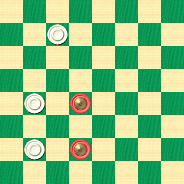
WHITE
White to Play and Win
W:W25,17,6:BK26,K18.
Click on Read More to see the solution, and be sure to stay tuned for future chapters in our story.![]()
The Checker Maven is produced at editorial offices in Honolulu, Hawai`i, as a completely non-commercial public service from which no profit is obtained or sought. Original material is Copyright © 2004-2025 Avi Gobbler Publishing. Other material is public domain, as attributed, or licensed under Creative Commons. Information presented on this site is offered as-is, at no cost, and bears no express or implied warranty as to accuracy or usability. You agree that you use such information entirely at your own risk. No liabilities of any kind under any legal theory whatsoever are accepted. The Checker Maven is dedicated to the memory of Mr. Bob Newell, Sr.

